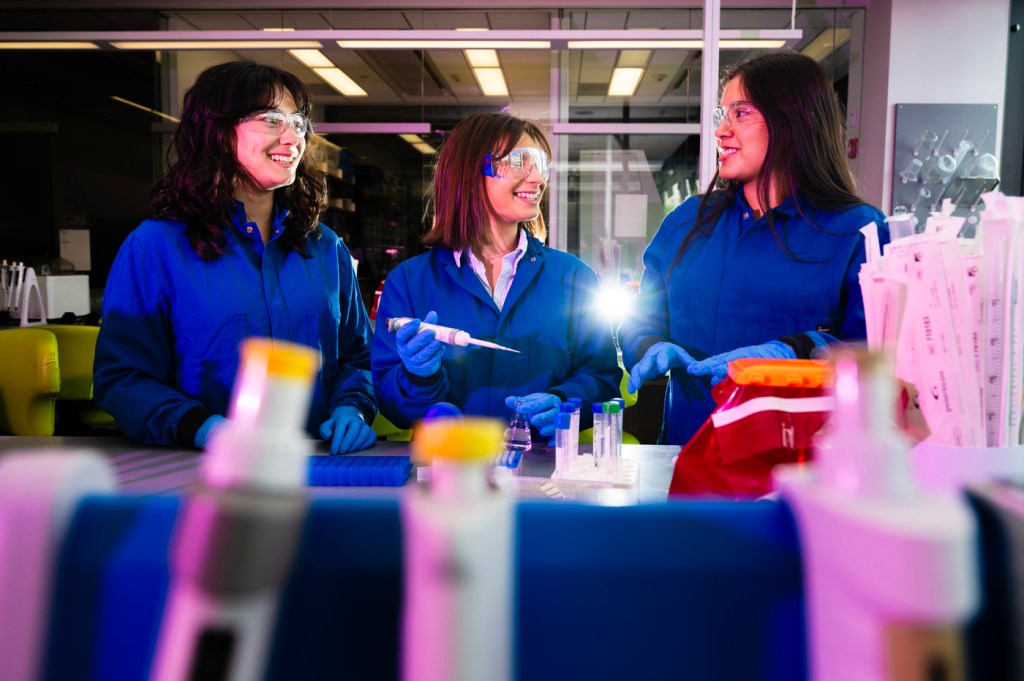Can you remove the foul odor from compost? These Northeastern engineering students want to make it smell like mint and lavender

Sometimes being green can get a little stinky.
Take the act of composting. A compost pile should simply smell like dirt, but things can go awry.
A pile may pick up a foul odor for a number of reasons. Maybe it hasn’t been mixed well enough, hasn’t received enough oxygen or is too moist. It’s also not uncommon for people to get confused about the right combination of browns and greens they should have in their piles. Many add too many plants or throw in pieces of meat or dairy products, causing an unpleasant smell.
Because of these potential issues, many are reluctant to start composting at all, especially individuals who live in small urban settings and have concerns that it will create a bad smell in their living spaces.
A group of Northeastern University bioengineering students are hoping to reduce that barrier by developing a solution that would make compost smell like mint or lavender by targeting the microbial process. It’s the first project to come out of Northeastern’s revitalized iGEM competition team, which is composed of about 16 undergraduate students.
IGEM stands for the International Genetically Engineered Machine Foundation. Every year, the foundation puts on a competition in which university and high school students from around the world showcase original science projects in the synthetic biology realm. This year’s competition will take place in late October at the Paris Convention Center.
Zoia Okulova, an incoming fourth-year bioengineering major and president of Northeastern iGEM, says the team decided to tackle composting, given Northeastern already has its own strong composting program. The university composts food at the dining halls on the Boston campus and at four dorm buildings: East Village, and West Village B, C and E.
“We came up with this idea of incorporating compost because we know Northeastern has a very big involvement in the sustainability pipeline,” Okulova says.
“We had a really long process of ideating the entire time and figuring out what people were interested in,” adds Mia Weisman, an incoming fourth-year bioengineering and biochemistry student and vice president of Northeastern iGEM. “People were super interested in composting because you see it every day in Northeastern’s dining halls.”
Composting will be a good target for Northeastern students, and more broadly Boston residents, given the limited amount of space they have in their dorms or living spaces, the group says.
The team recently received the PEAK Experience Award from Northeastern’s Office of Undergraduate Research and Fellowships to help fund the project.
Editor’s Picks
“Imagine if a student is keeping compost in their dorm,” Weisman says. “They might not want that to smell up their entire small room. So this project is a way to increase accessibility to composting.”
So, how will they do it?
At a fundamental level, composting is a microbial process, explains Benjamin Woolston, a chemical engineering professor at Northeastern University and one of faculty advisers for Northeastern iGEM.
“There’s microorganisms living in the material that’s being composted. They are helping to break it down from really complex fibers and sugars into simpler components,”says Woolston.
The team understands the process that leads to compost smelling poorly has to do with “enzymatic pathways” that make up the microbes in the piles, he says. The key is to disrupt that process by engineering microbes that can produce compounds that have a more pleasurable odor. This process will involve the team working with three different bacteria strains including Escherichia coli, Bacillus subtilis and Pseudomonas putida.
But the goal isn’t just to make the compost smell better, but also to deter vermin. The team says that lavender and mint smells have actually been shown to be good deterrents for rodents and other small animals.
This isn’t the kind of project that can be done in a week or even a few months, Woolston and iGEM’s team leaders explain. It could take years before the team could have a fully fledged solution that regular people could one day use themselves.
For the next few months, the team is first targeting the specific chemical processes involved with bringing this project to life by doing wet lab work at the university, explains Karina Millicani, an incoming fourth-year bioengineering major and the secretary of Northeastern iGEM.
Woolston has confidence the team will be successful in that process.
“Engineering the microbes to make these compounds in test tubes in the lab is doable,” he says. “This is what the field of metabolic engineering specializes in. This is where my lab and this type of expertise comes in. We’ve been doing this for 20 years now.”
Outside of wet lab research, the team also plans to work with the Northeastern and Boston communities on the project to encourage more people to start composting and reduce some of the barriers associated with it, including a lack of availability of compost drop-off areas, which may force people to not be able to get rid of their piles in a timely manner.
“iGEM has a really big emphasis on community outreach,” Weisman says. “We’ve been in contact with a number of gardening associations in Boston, and one of our main goals in human practice is to increase the amount of drop-off sites. If you look at a map of Boston there are only like 14 drop-off sites, and Boston is pretty massive. There’s a big lack in Back Bay and the South End.”
They also plan to reach out to Boston local schools to help set up educational programs around composting.
The goal is to present their findings at this year’s iGEM competition and continue to build on the compost project in the year to come.
It’s a big moment for the club, which officially regained status as an official organization this past spring. (A former version of the Northeastern iGEM team existed in years past but had been dormant since 2016.) Okulova revived the club/competition team with the help of Weisman and Millican.
Woolston helps mentor the team with Elizabeth Libby, a Northeastern bioengineering professor.
With the relaunch of Northeastern iGEM, Woolston says he is looking forward to seeing the university’s excellence in synthetic biology grow.
“From an educational standpoint, it’s great,” he says. “We are getting more students to get experience with synthetic biology, which is really important for a range of careers in biotechnology.”
Libby adds that iGEM is “great fun” and “one of the best experimental science experiences for undergraduates available.”
“One of the wonderful things about iGEM projects is that they all sound like science fiction until they work,” she says. “Then they turn into just science!”











